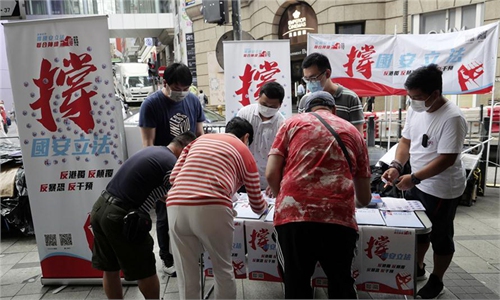
Pedestrians on the street of Hong Kong's financial district Photo: cnsphoto
Hong Kong Special Administrative Region (HKSAR) Financial Secretary Paul Chan Mo-po said Sunday he is confident and optimistic that Hong Kong will remain an international financial center, after Chief Executive Carrie Lam expressed confidence Saturday.
The US has threatened to strip its special trade and customs privileges of Hong Kong, which will only have a limited impact, wrote Chan, on the online news platform of the HKSAR, adding that he is confident and optimistic about Hong Kong's future as an international financial center and its attraction, as always, to capital and investors.
"As the world's third-largest US dollar trading center, Hong Kong provides a variety of investment, wealth management, trade and financial settlement services for international companies, and it is closely linked to the global economic and financial system. Any shock to Hong Kong's financial system would also bring great shocks to global financial markets, including the US, and even weaken international market confidence in the use of the US dollar and holding of US financial assets," Chan said.
In 1997, at the time of the handover, Hong Kong's stock market capitalization stood at HK$3.2 trillion ($413 billion). Now, 23 years later, the figure exceeds HK$36 trillion, increasing over 10 times. During the past two years, 87 new high-tech companies have listed in Hong Kong, raising more than HK$300 billion.
Chan noted the rising trend for secondary listings on the Hong Kong stock market for Chinese mainland-based companies already listed on other overseas markets. He noted Alibaba's listing last year, followed by other technology firms, including NetEase and JD.com.
"The return of China's technology giants to Hong Kong market is a direct reflection of the strong support from the mainland for Hong Kong's economy amid rising tensions amplified by the US," said Hong Tao, director of the Institute of Business Economics at Beijing Technology and Business University.
Investors often vote with their feet and money moves in keeping to market costs and risks, an analyst who works in a bank based in Hong Kong told the Global Times Sunday on condition of anonymity.
"Hong Kong will remain for a long haul the best springboard for foreign capital that wants to enter the Chinese mainland and for the mainland companies that want to avoid geopolitical risks, especially the uncertainty stemming from the US," said the analyst.

